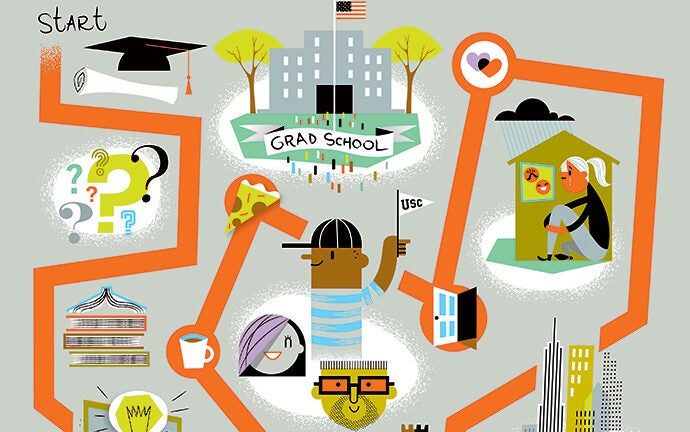
Game of Life
College students hear an awful lot about the “real world.” Relatives, professors, neighbors and even well-meaning strangers feel compelled to dispense advice about this almost mythical place. For some it can provoke a sense of foreboding and uncertainty; others may have an overly rosy view of what is in store for them after graduation. The fact is, most young alumni will experience a reality check of some sort once they adjust to their new lives. Indeed, their education doesn’t stop beyond the USC campus — it’s just a much bigger classroom.
The advantages of adaptability
After all the effort and subsequent excitement of landing a new job, experiencing occasional bad days at work is inevitable. Adjusting to less than ideal circumstances and negotiating difficult situations becomes part of the deal. But good or bad, each day offers opportunities to learn along the way, both professionally and personally.
Kelly Hann ’13 works as a nurse at the Children’s National Medical Center in Washington, D.C. Her current post is on the pediatric hematology, oncology and bone marrow transplant floor, where she often cares for young cancer patients. At times it is an emotionally draining experience.
“[The job] can be exhausting, but a good kind of exhausting,” she explained. “You focus on the small victories, like ‘I made that kid laugh today’ or ‘that parent gave me a hug.’ ”
Recently, Hann had a 4-year-old patient who was undergoing chemotherapy, and one day the little girl was particularly resistant to her treatment.
“She was fighting tooth and nail,” Hann said. “We finally agreed that if she took her medicine, she could paint my fingernails light blue. After that she was in the best mood. I saw her the next day and she was so excited to see I’d kept the polish on.”
That, Hann said, was a good day.
Laura Martinez ’14 decided to teach English as a second language after graduating with an international relations degree. She took a job in Thailand through the Council on International Education Exchange.
“As an ESL teacher, each day is exciting and new, but also coupled with its own set of challenges and frustrations.”
The single greatest strategy Martinez has developed to work through difficulties in her job is to keep an open mind and go with the flow.
“I’m much more aware of how conditioned I used to be to constantly over plan and try to over control situations. In a job that is continually changing and full of unexpected occurrences, the best thing I can do is to be flexible and adjust accordingly.”
Graduating the graduate school
Some new grads postpone their entry into the workforce by pursuing further education, which presents different challenges. As a first-year student at Cornell Law School, Anthony Wu ’14 experienced “the hardest academic year of my life.” The reality of law school meant letting virtually no time go to waste, he said, and being keenly aware of the importance of his investment.
“You’re paying a lot of money and using time that could be spent working, so in that sense you have to focus even harder on your studies and really dedicate yourself.
“You have to be very careful about time management and sticking to schedules.”

Some of the wake-up calls of life in the “real world” include having less free time, having to manage personal finances, and getting used to a different kind of social life. But new freedoms and growing wisdom are also part of the equation.
For Hann, as she pursued her nursing credentials at Johns Hopkins University and then began working, she found the unique academic focus she had as a health and humanity major at USC Dornsife to be very beneficial, particularly her concentration in psychology.
“I use the material I learned from my undergraduate psychology training all the time. At Hopkins, having the combined psychology/biology background made my nursing classes easier. It felt like I had a leg up in terms of understanding things like cognitive processes and empathy.”
We’re not in Kansas anymore
Following graduation in 2013, international relations alumna Rebecca Braun served two years in Cameroon with the Peace Corps. Working as a youth development volunteer, she taught young people about sexual reproductive health, healthy life skills and empowerment for girls.
Going into the experience, Braun was aware that the Peace Corps would be challenging.
“I said, ‘OK, I may not have running water or electricity. I won’t have supermarkets. How am I going to take care of myself?’
“But once I figured all that out, I realized that physical discomfort is the easiest part of living in a foreign country. It’s much harder to adjust to different ways of communicating, a second language or differences in the relationships between men and women.”
Living abroad helps you learn a lot about your own culture, she said, when you see all the peculiar aspects of a foreign culture and then realize how peculiar your own can be.
“When you travel, you learn things you can’t learn from a book. I’ve learned so much about race, poverty and development,” she said. “Seeing the world is the best education you can get.”
In Thailand, Martinez said she has learned innumerable lessons surrounding the themes of perspective, patience and adaptability. A commonly used phrase in Thailand is mai pen rai, which approximates “no worries.”
“It captures an essence of the Thai culture that permeates the country across its people and customs and the lifestyle,” she said. “It means go with the flow, don’t sweat the small stuff, and recognize it’s all going to be OK.”
Although she initially experienced frustration in the face of a very different pace of life in Thailand, after a year in the country, she has come to deeply internalize this ethos. She is more patient and easy going.
“Living and working in another country has taught me that there is always another lens to view an issue through. Living abroad forces one out of one’s dominating life perspective and to consider an alternative.”
A different social scene
One aspect that graduates do not always anticipate is the transformation that their social lives undergo once they leave school. When they are living in the dorms, there is always an open door down the hall and someone who feels like talking or going out. But in the full-time working world, they have to navigate differing schedules and the fact that friends are now scattered across the country.
“In college, everyone is basically your age and you have common interests,” Hann said. “In the real world, it’s a lot harder to meet new people and there isn’t always someone who wants to go out. That’s been a bit shocking — it’s like, ‘Wait, how do grown-ups make friends?’ ”
Those living abroad are even farther from the comfortable social bubble they knew as students. For Braun, the Peace Corps was the first time she had ever lived alone, and being so far from family and friends, she had a lot more time on her own.
“College for me was about learning to live with other people, like roommates. Being in Cameroon, one of the things I’ve had to learn is how to live with myself.”
Network it
Even before they land their dream job or move on to further educational opportunities, many graduates have already learned the importance of planning and forethought as a critical step toward attaining their goals. One invaluable tool they can use as undergraduates is networking, which can yield everything from work experience and mentorship to potential job offers.
Wu took part in the Gateway Internship Program while a junior at USC Dornsife. The program offers work experience, professional mentorship, networking opportunities and an academic leadership skills course. He interned with ARC Document Solutions Inc., a company that provides document and information management solutions for businesses of all types.
“It was a great experience to see what it’s like working with colleagues and showing up to work every morning — normal things about work that you don’t really know as a student but you learn about through internships,” Wu said.
He got the chance to meet with mentor and company CEO K. “Suri” Suriyakumar, a USC Dornsife Board of Councilors member. His internship supervisor provided a glowing letter of recommendation that bolstered his law school application.
During her nursing job search, Hann received offers in four states. All came about through her networking efforts, she said.
“If I’ve learned anything, it’s that networking is the key to success. Society 53 [USC Student Alumni Society’s leadership program] taught me how to network, be professional and interact with people. I learned how to build those relationships, which always used to make me a little uncomfortable.”
Hann reflected on her experiences as a full-fledged member of the workforce.
“I think some people try to scare you about the real world,” she said. “But it’s not nearly as scary as they make it out to be, especially if you find a career that you want to be in.”
Illustrations by Kirsten Ulve for USC Dornsife Magazine
Read more stories from USC Dornsife Magazine‘s Fall 2015-Winter 2016 issue >>